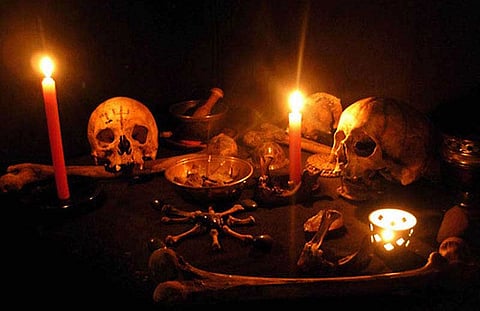

The controversial Karnataka Prevention and Eradication of Human Sacrifices and Other Inhuman, Evil and Aghori Practices and Black Magic Bill 2016 has finally been cleared by the state cabinet.
After facing flak for putting the bill on the backburner, the Karnataka cabinet approved the bill on Wednesday.
“The bill has clear definitions on what is a belief. A belief is a voluntary faith in something that has scientific backing and a superstition is defined as a forced belief in practices that have no scientific relevance. The scrutiny committee has cleared the bill and we will table it in the upcoming Assembly session no matter what,” Law Minister TB Jayachandra said.The Law Minister said that every point in the bill will be thoroughly discussed during the Assembly session.
The bill has proposed to ban made snana, a ritual performed at the Kukke Subrahmanya Temple in Dakshina Kannada that involves people rolling over a banana leaf with food left over by Brahmins. It is believed by many to have cured skin diseases.
Which practices are proposed to be banned?
Performing any black magic, inhumane act and evil practices in search of treasure or bounty, tantric acts which include physical and sexual assault will be banned if the bill is passed by the Assembly. Practices such as parading people naked, ostracising a person in the name of a ritual and encouraging inhumane acts during said rituals also come under the purview of the bill. Rituals of exorcism, assaulting people under the pretext of exorcism, misinformation and creating a panic-like situation under the pretext of ghosts and black magic will also be banned. Other practices such as making claims of having healing power, propagating practices that involve self-mutilation and coercing people to perform fire-walking will also be banned.
Which practices are not included?
Any form of worship including pradakshine, yatra, parikrama at any religious shrines, harikatha, keerthana, pravachana, bhajans does not come under the purview of the bill. Providing knowledge of ancient, arts and practices, speaking about miracles performed by deceased saints and literature on them offering prayers, upasana, religious rituals at places of worship or at peoples homes, religious celebrations, festivals, processions, piercing of ears and nose, shaving of head, astrology and Vaastu are considered acceptable under the bill.
“The consent of the victim cannot be used as a defence for the list of offences committed by a person. It will be cognizable and non-bailable. Punishment will vary from two to five years imprisonment or fine or both,” Minister Jayachandra said.
Rationalists remain unhappy with the draft and are calling the bill watered-down. “This bill is of no use. It does not put an end to superstitious practices at all. Such practices can be stopped only through education. Merely having a law against it will not stop people from believing in superstition. The government must create awareness and educate people about the redundancy in succumbing to superstitious beliefs. We will demand that the government come up with a better bill,” said Professor Narendra Nayak, President of the Federation of Indian Rationalists.
According to Narendra Nayak, President of the Indian Rationalist Association, belief in black magic is rampant in the Hyderabad-Karnataka belt, especially in Bidar, Raichur, Gulbarga, Ballari and Koppala.
“When I had toured these regions, most of the people in the villages attribute any inconvenience in their lives to black magic. When I had visited a village in Bidar, an incident of rape, hair shaving, assault and nude parading of a nurse in the village had been reported. The villagers had attributed this “punishment” to the women as they believed she was a witch. It was later learnt that she had repeatedly rejected the advances of the village elders who wanted to extract revenge,” he added.
From cause for family misunderstandings to health issues, people in these remote villages of Hyderabad-Karnataka belt are extremely superstitious, he added.
“In Khajuri village in Gulbarga, a little girl was kidnapped, flayed and beheaded by some villagers who were looking for treasure. I have seen people blame black magic for their health problems and the presence of quacks in these areas is rampant. People go to them before doctors,” Nayak said.
The rationalist thinker also said that the Prevention and Eradication of Human Sacrifice and other Inhuman Evils and Aghori Practice and Black Magic Bill was put on the backburner in Karnataka after severe opposition from various religious organisations.
The state government had proposed the Karnataka Prevention of Superstitious Activities Bill in 2013, right after the Congress came to power in the state. Chief Minister Siddaramaiah had promised to put an end to such practices during his election campaign.
Barring Chief Minister Siddaramaiah and Law and Parliamentary Affairs Minister TB Jayachandra, no other member of the cabinet supported the bill when it appeared for clearance in July 2016.
In February this year, it was decided that the bill would be put on hold until the elections are over as many MLAs and even Ministers do not want to offend residents of their constituencies by passing it. They fear that it would hurt their sentiments. There were 23 practices listed in the original bill and barring human sacrifice, most of them have been scrapped in the revised bill.